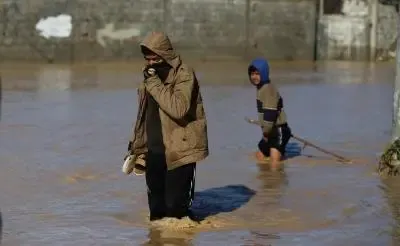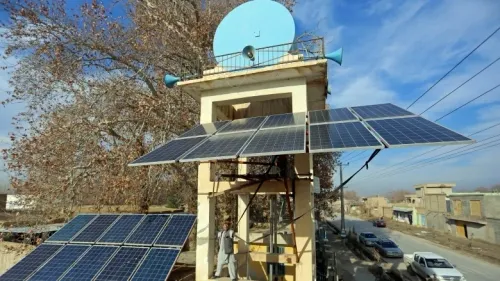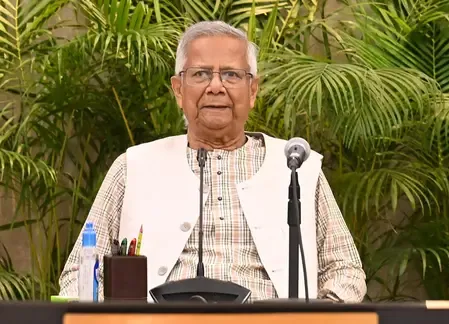How is the UN Responding to Heavy Rains Flooding Displaced Families in Gaza?

Synopsis
Key Takeaways
- Urgent humanitarian response is underway in Gaza after severe flooding.
- Thousands of displaced families are in dire need of shelter and essential supplies.
- UN authorities report significant challenges in accessing necessary equipment.
- Health and safety concerns are rising due to harsh weather and explosive remnants.
- Continued support and access to humanitarian aid are crucial for recovery.
United Nations, Nov 15 (NationPress) - Humanitarian organizations are mobilizing to offer shelter assistance and have dispatched rapid response teams following severe rainfall that inundated thousands of displaced families in Gaza, according to the UN Office for the Coordination of Humanitarian Affairs (OCHA).
The torrential rains have profoundly affected residents throughout the Gaza Strip, damaging personal property and leaving numerous displaced families fully exposed to inclement weather, which heightens health and safety concerns, particularly for the elderly, individuals with disabilities, and other vulnerable populations, as reported by OCHA.
Partners have indicated that effective flood prevention necessitates equipment that is currently unavailable in Gaza, including tools for draining water from tents and clearing debris. Millions of essential shelter items remain stranded in Jordan, Egypt, and Israel, awaiting the necessary approvals for entry into Gaza, the office stated.
OCHA noted that since the ceasefire on October 10, Israeli authorities have denied 23 requests from nine partners seeking to bring nearly 4,000 pallets of vital supplies into Gaza. These supplies include tents, sealing and framing kits, bedding, kitchen sets, and blankets, as reported by the Xinhua news agency.
Shelter partners revealed that the primary obstacle lies in stringent registration regulations for non-governmental organizations. In nearly all of the 23 rejections, the rationale provided was that the submitting entities were not authorized to deliver humanitarian assistance to Gaza.
OCHA has mentioned that approximately 1,000 tents were distributed to families in Deir al-Balah and Khan Younis on Thursday. Between Sunday and Wednesday, partners managed to provide about 7,000 blankets to over 1,800 households, approximately 15,000 tarpaulins to more than 3,700 households, and winter clothing to over 500 households.
The dire living conditions have also heightened individuals' exposure to unexploded ordnance, with children being particularly at risk, as stated by the humanitarian office.
“Some individuals have sustained injuries while gathering firewood; others are compelled to set up tents near areas suspected of harboring unexploded remnants simply because they lack safer alternatives,” the report noted.
OCHA indicated that since the ceasefire, organizations focused on mine action have documented over 10 injuries resulting from explosive hazards. This risk is exacerbated by Gaza's limited geographical size, which offers little opportunity to avoid areas suspected of contamination.
Since the ceasefire, partners have addressed more than 70 requests for explosive hazard evaluations, supported 32 inter-agency missions, and conducted risk education sessions for over 49,000 individuals across the Gaza Strip.
The UN Mine Action Service has reported that it could significantly enhance its operations as soon as teams gain access to detectors, spare parts, and equipment necessary for the safe disposal of explosive hazards.









